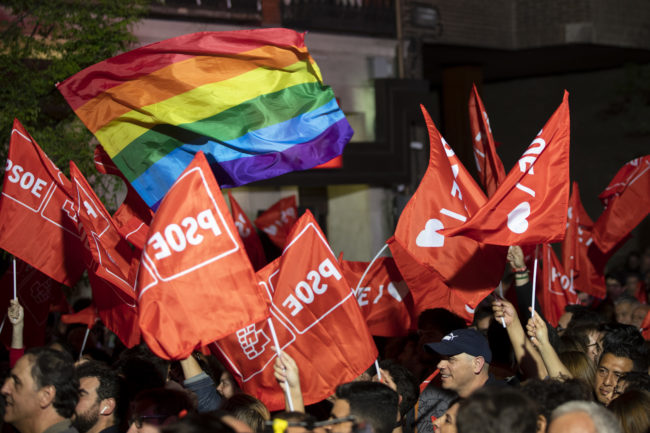Spanish election: Anti-LGBT Vox party makes political breakthrough

Vox party leader Santiago Abascal delivers a speech during an election night rally in Madrid. (Oscar Del Pozo/AFP/Getty)
The far-right Vox party won just over 10 percent of the vote in Spain’s general election.
Vox will take 24 of the Congress of Deputies’ 350 seats following the Spanish election, held on Sunday (April 28).
Its success marks the first time that a far-right party will sit in parliament since the 1975 death of military dictator General Francisco Franco, who had ruled the country since 1939, after leading the Nationalists to victory in the Spanish Civil War.
The incumbent Socialist Workers’ Party (PSOE) won the most votes but just 123 seats, putting it 53 short of an overall majority.
It will now look to form a coalition government, most likely with the support of the anti-austerity Unidas Podemos and a handful of regional and nationalist parties.
While the chances of Vox forming part of that coalition are slim, the party’s leader Santiago Abascal found cause to celebrate as the results came in.
“Welcome to the resistance,” he told a crowd of supporters on Sunday (April 28), according to The Times.
“Welcome to the resistance.”
—Santiago Abascal
“This is just the start. Vox now has a voice in parliament.”
Vox made first gains in 2018 ahead of 2019 Spanish election
Founded just five years ago as an offshoot of the conservative Popular Party, Vox has risen to prominence on a wave of nationalist populism.
It made its first real breakthrough in December 2018, when it won 12 seats in the Andalusian regional election.
Its support has grown in the wake of a constitutional crisis which followed the failed Catalonian declaration of independence.
Vox opposes Catalonia’s autonomy and would abolish its regional government.
Vox opposes LGBT+ families
Vox’s leader Abascal regularly speaks out against what he calls “supremacist feminism and gender totalitarianism.”
He and his colleagues oppose same-sex marriage, and have proposed introducing a separate form of civil union.
Abascal told the Spanish TV channel Antena 3: “We don’t consider a relationship between two men or two women to be a marriage, but it’s a civil union that needs regulating.”
“We don’t consider a relationship between two men or two women to be a marriage.”
—Santiago Abascal
They also oppose surrogacy or adoption by gay or lesbian couples, but say that they have nothing against LGBT+ people.
Critics have accused the party of stoking Islamophobia, xenophobia and misogyny.
Abascal has spoken about building walls around Melilla and Ceuta, Spain’s enclaves in Northern Africa, in order to keep illegal immigrants from entering.
The party has also suggested that domestic violence laws are weighted unfairly against men, and takes a pro-life stance on abortion.

Spanish Socialist Workers’s Party (PSOE) supporters wave a LGBT+ pride flag after polls closed in the Spanish election. (Pablo Blazquez Dominguez/Getty)
Since Spain’s Prime Minister Pedro Sánchez called the Spanish election on February 15, campaigners have come out in force against Vox.
In March the party enlisted as a candidate Fernando Paz, a Holocaust denier and supporter of so-called conversion therapy.
Paz had said that facts surrounding the Holocaust were “far from having been established with accuracy,” according to Spanish newspaper El Pais, and in 2013 told the Spanish television programme El Gato Al Agua: “If my son told me he was gay, I would try to help him. There are therapies to treat this psychology.”
On March 23, less than a week after his candidacy was announced, Paz dropped out of the election citing a “media hunt.”

